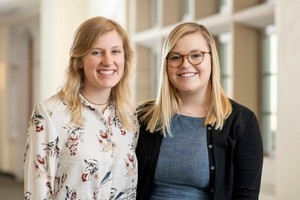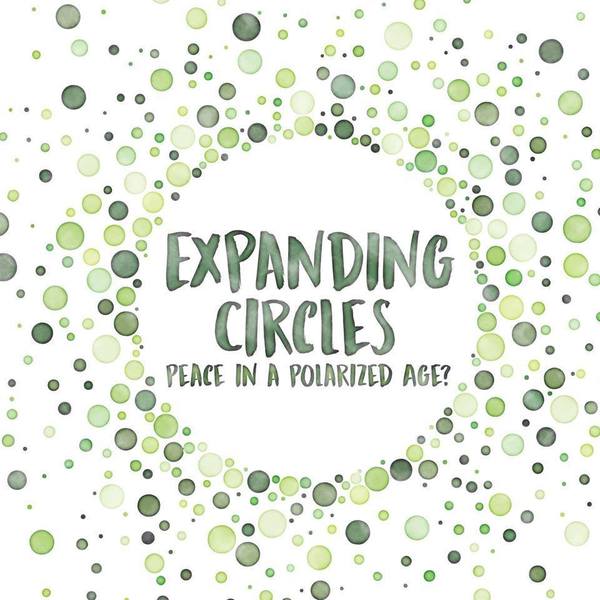 Madeleine Thompson and Monica Montgomery. Photo: Barbara Johnson/University of Notre Dame
Madeleine Thompson and Monica Montgomery. Photo: Barbara Johnson/University of Notre Dame
The Notre Dame Student Peace Conference, endowed by Joan B. Kroc and sponsored by the Kroc Institute for International Peace Studies, is an annual gathering organized by students and for students. Its mission is to provide space for graduate and undergraduate students from all colleges and universities to dialogue about peacebuilding, social justice, and conflict transformation. Each year, the event draws hundreds of students from across North America and around the world.
This year’s conference will focus on the theme, “Expanding Circles: Peace in a Polarized Age?” It will take place March 29-30 at the Hesburgh Center for International Studies on the campus of the University of Notre Dame. The conference will also include a keynote session featuring Delaney Tarr, a founding member of the March For Our Lives movement.
Notre Dame seniors Monica Montgomery, a political science major with a supplementary major in peace studies, and Madeleine Thompson, a theology major with a supplementary major in peace studies and minor in Catholic Social Tradition, are serving as co-chairs of the conference planning committee.
Here they reflect on their hopes for the conference, the importance of peace studies and what they’ve learned through the planning process.
Why did you say yes to serving as co-chairs for the Student Peace Conference this year?
Monica: I first attended the conference after declaring my peace studies supplementary major during my freshman year, and then I was on the planning committee during both my sophomore and junior years. I always thought serving as a co-chair could be a special way to culminate my peace studies experience.
Madeleine: I heard about the co-chair opportunity through Monica, and I was so excited. Since we studied abroad together in Jerusalem, we know each other’s work habits and hobbies, and our strengths and weakness complement each other really well. I’ve loved my peace studies major, but I know how different Monica’s and my experiences within the major have been. I’ve been more focused on grassroots one-on-one healing work, and Monica has had incredible international policy experiences, so together we have a broad picture of the peace studies field.
The idea of helping to craft a theme and atmosphere for the conference also really appealed to me.
What are some of the unique gifts of this particular conference?
Madeleine: Our interdisciplinary nature at the Kroc Institute is really highlighted throughout the conference. We lean into that and recognize that a lot of schools don’t even have full peace studies majors, so we are inviting people from all different fields and backgrounds to come and present and engage each other.
Monica: One of the things we say a lot is that it’s a low pressure, high reward environment. It does expose students to great opportunities to talk about their work and to engage with students in their discipline, but in a way that should hopefully be welcoming to everyone. Especially given our theme this year, we are really trying to be inclusive of everyone who is interested in engaging the peace studies discipline and work from a variety of perspectives.
Since you mentioned inclusive peacebuilding, could you say a bit more about how you chose this year’s theme?
Monica: At first I was thinking about disarmament as a theme and Maddie was focused on inclusive peacebuilding. We decided to try to consult everyone we could imagine here on campus. We talked with Kroc Institute professors, friends, and students. We were thinking a lot about how we could make the topic specific enough to guide the

conference, but broad enough that all kinds of research could fit within it.
Madeleine: Many of the major issues that we see students talking about, and that the world and country are facing, can really fall under this heading of polarization. Peace studies professors were helpful in just giving us the space to ask a thousand different questions and encouraging us to go big.
The idea of having a question in our title was also something we were also excited about. Not having the theme written with a regular subtitle or statement gives people more space to engage.
What do you think the unique contribution of peace studies is in helping people to think about moving past polarized positions on contentious issues?
Madeleine: It’s the importance of hearing narrative, whether its personal or an expert’s research in the field. When I think of polarization, another word that often comes to mind is disagreement. We can have a tendency to invalidate or disagree with someone else’s narrative or experience right away. What I’ve learned here at Kroc has been to listen and receive and then to also research and analyze. My hope is that we create space for people to share narratives, story, and research and that we can listen and receive that input, but also wrestle with those stories in a generative and safe space.
Monica: Peace studies provides broad frameworks to work within, as well as ways to look at the world and ways to address particular situations, but it’s also very focused on how those frameworks adapt to each particular case. It encourages us to use the tools of history and the broad frameworks we have, but to try to look carefully at the situation right in front of us. This practice can really help in situations of polarization.
Madeleine: One of the things I didn’t expect and that I learned in peace studies is how important conflict can be. We’re not trying to eradicate conflict, but rather eradicate violence that stems from conflict. It’s ok if we disagree and if we come from different perspectives and have different ways that we implement strategy, but how can we also then learn not to allow those disagreements to completely disrupt our communities or our ability to work together.
What made you think about the March for Our Lives movement and Delaney as an ideal keynote speaker?
Monica: We think March for Our Lives is the example of an organization and group a people who have kind of said, “No, we’re not going to live in a polarized system around gun issues. We are going to build our own way of lobbying, canvassing, and leading marches.” They are inserting a new narrative into a polarized situation and taking ownership of addressing this horrific behavior that causes harm.
They also emphasize that they represent only one school and 14 kids who were killed. It was horrible, but that is nothing compared to the total violence from guns seen every day.
Madeleine: When we were thinking about a keynote speaker, having a student as a keynote seemed logical since this is a student-led conference. There are so many incredible speakers with established careers that could talk about this topic, but with this conference we have this opportunity to do something a little different and to hear from a woman, a student, and a survivor.
What would it take for you to look back on the conference and to feel like it was a success?
Monica: I would like to see some broad conclusions and takeaways that people have leaving the weekend about how we can engage and understand strategic and inclusive peacebuilding. Maybe they still feel grim about Congress or political polarization, but hopefully they also leave having seen nonviolent methods, cases, and advocacy across the world that show that it is possible to have peace despite polarization.
Madeleine: I have been thinking about our conference logo design. In the innermost part of the logo circle, the dots are so close together and then they gradually spread out. I would love for students to leave with ideas about how to expand circles and about how to do this peacebuilding work. I think there is something really special about learning from other students in a wide variety of fields, ages, and disciplines, and I hope we can really lean into that.
Conference registration is open through March 21 To register and for more information about the conference, visit sites.nd.edu/peacecon.